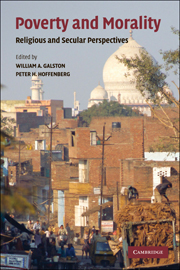Book contents
- Frontmatter
- Contents
- Contributors
- Acknowledgments
- 1 Introduction
- 2 Global Poverty and Unequal Development
- 3 The Karma of Poverty
- 4 Poverty and Morality in Christianity
- 5 Classical Liberalism, Poverty, and Morality
- 6 Confucian Perspectives on Poverty and Morality
- 7 Poverty and Morality
- 8 Hinduism and Poverty
- 9 The Problem of Poverty in Islamic Ethics
- 10 Jewish Perspectives on Poverty
- 11 Liberal Egalitarianism and Poverty
- 12 Marxism and Poverty
- 13 Poverty and Natural Law
- 14 Afterword
- Select Bibliography
- Index
- References
1 - Introduction
Published online by Cambridge University Press: 05 June 2012
- Frontmatter
- Contents
- Contributors
- Acknowledgments
- 1 Introduction
- 2 Global Poverty and Unequal Development
- 3 The Karma of Poverty
- 4 Poverty and Morality in Christianity
- 5 Classical Liberalism, Poverty, and Morality
- 6 Confucian Perspectives on Poverty and Morality
- 7 Poverty and Morality
- 8 Hinduism and Poverty
- 9 The Problem of Poverty in Islamic Ethics
- 10 Jewish Perspectives on Poverty
- 11 Liberal Egalitarianism and Poverty
- 12 Marxism and Poverty
- 13 Poverty and Natural Law
- 14 Afterword
- Select Bibliography
- Index
- References
Summary
“The poor are always with us” – at all times, in every society. Nonetheless, societies have responded differently to the enduring questions such privation raises: who is poor, why are some poor while others are not, and what (if anything) should be done about their condition?
In keeping with the Ethikon Institute’s mission of addressing significant global public policy questions in its Series in Comparative Ethics, this volume explores how great moral traditions, secular and religious, Western and non-Western, wrestle with basic questions about poverty and the poor. These traditions include Buddhism, Christianity, Confucianism, Hinduism, Islam, and Judaism among the religious perspectives; classical liberalism, feminism, liberal egalitarianism, and Marxism among the secular; and natural law, which might be claimed by both.
- Type
- Chapter
- Information
- Poverty and MoralityReligious and Secular Perspectives, pp. 1 - 14Publisher: Cambridge University PressPrint publication year: 2010

